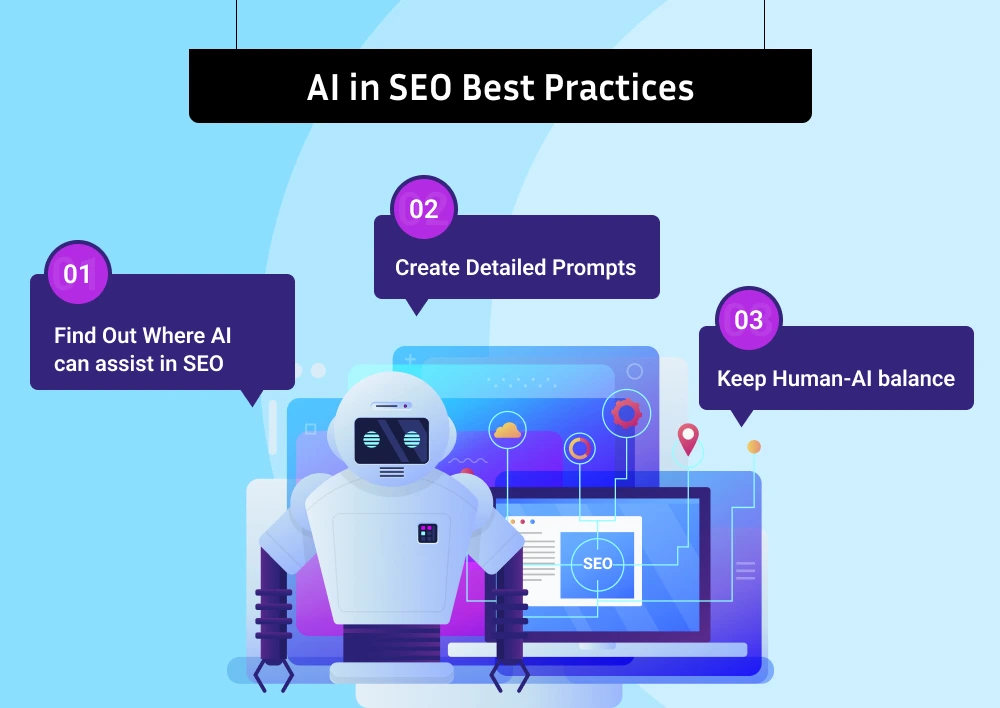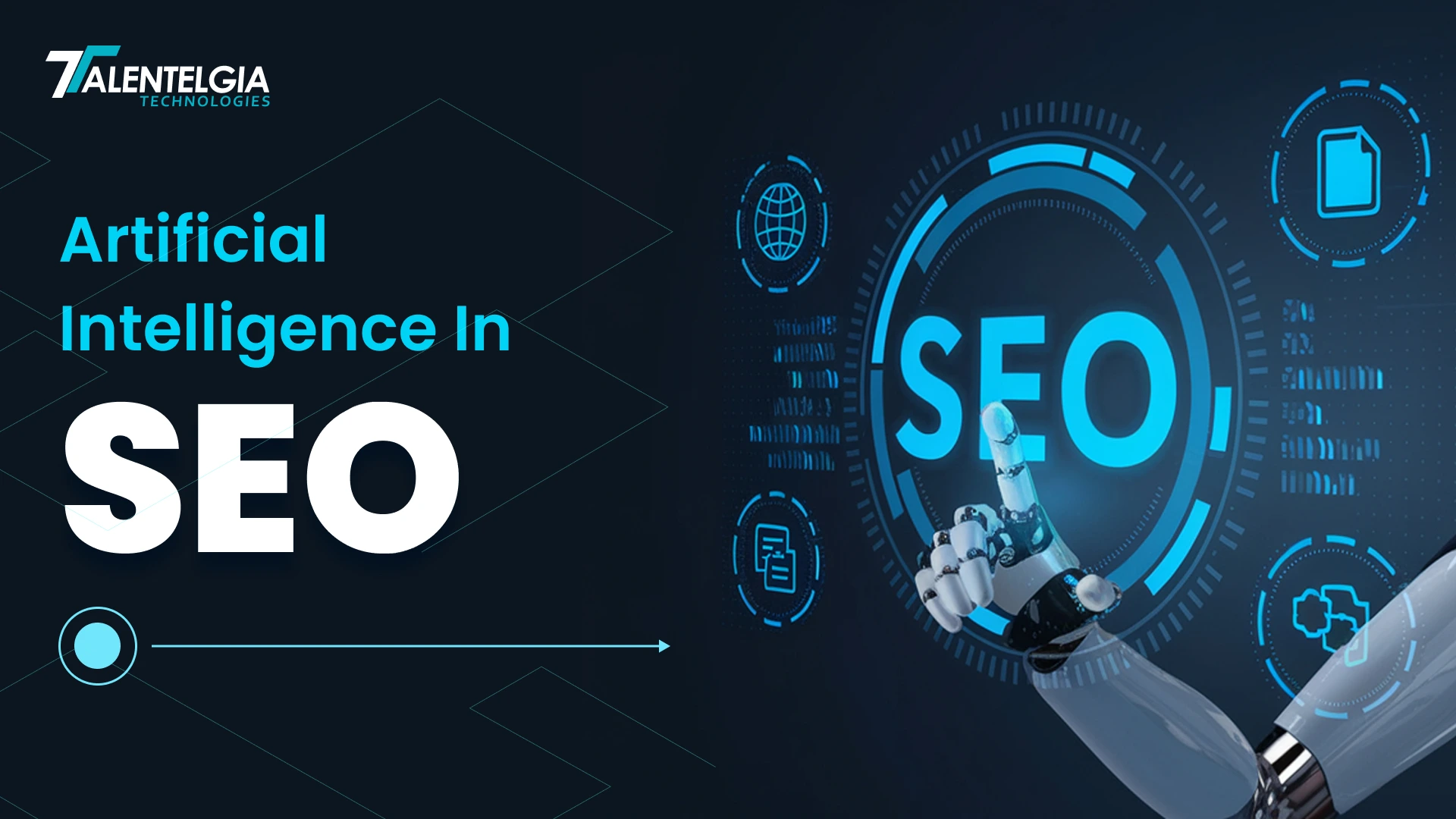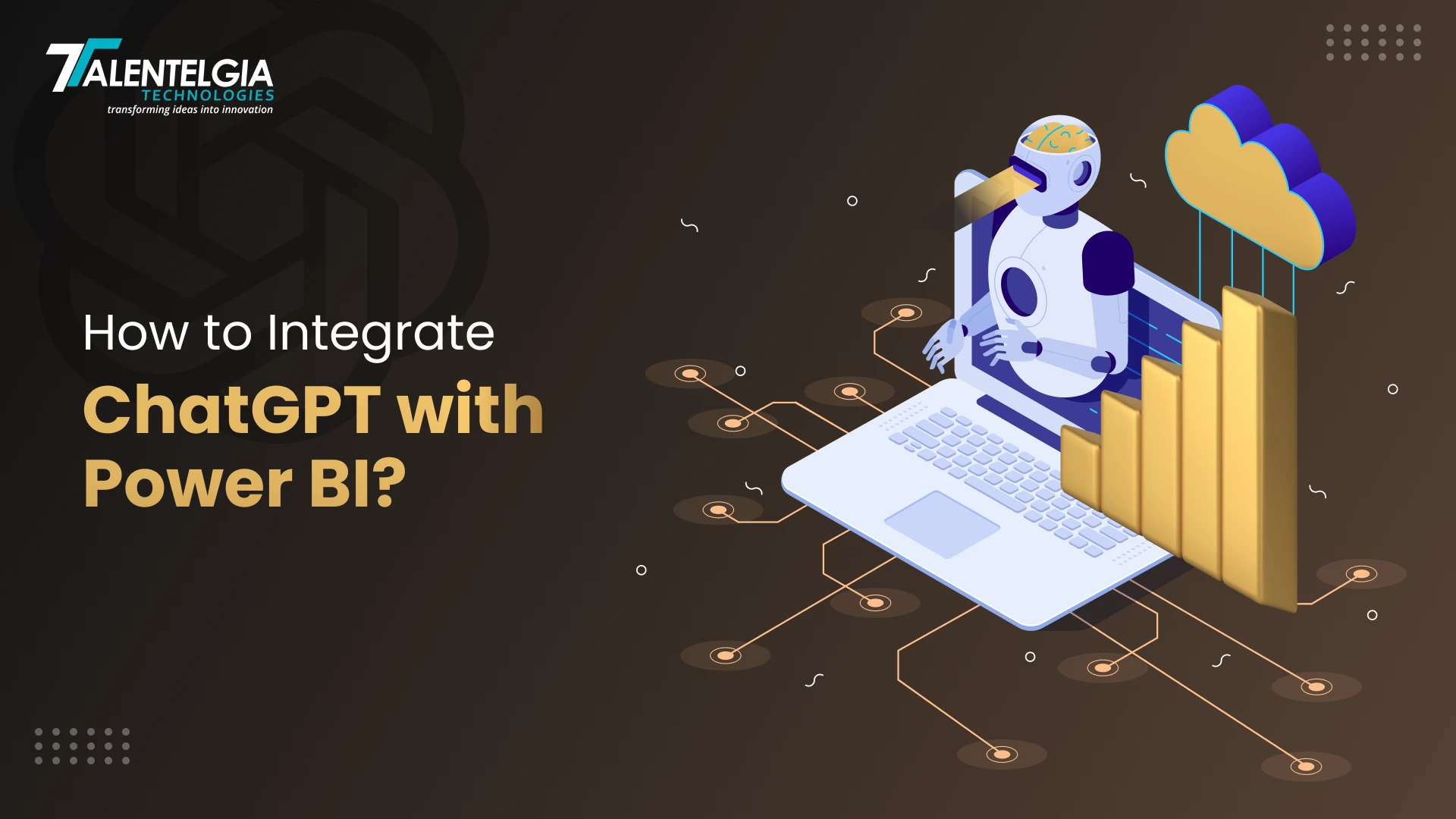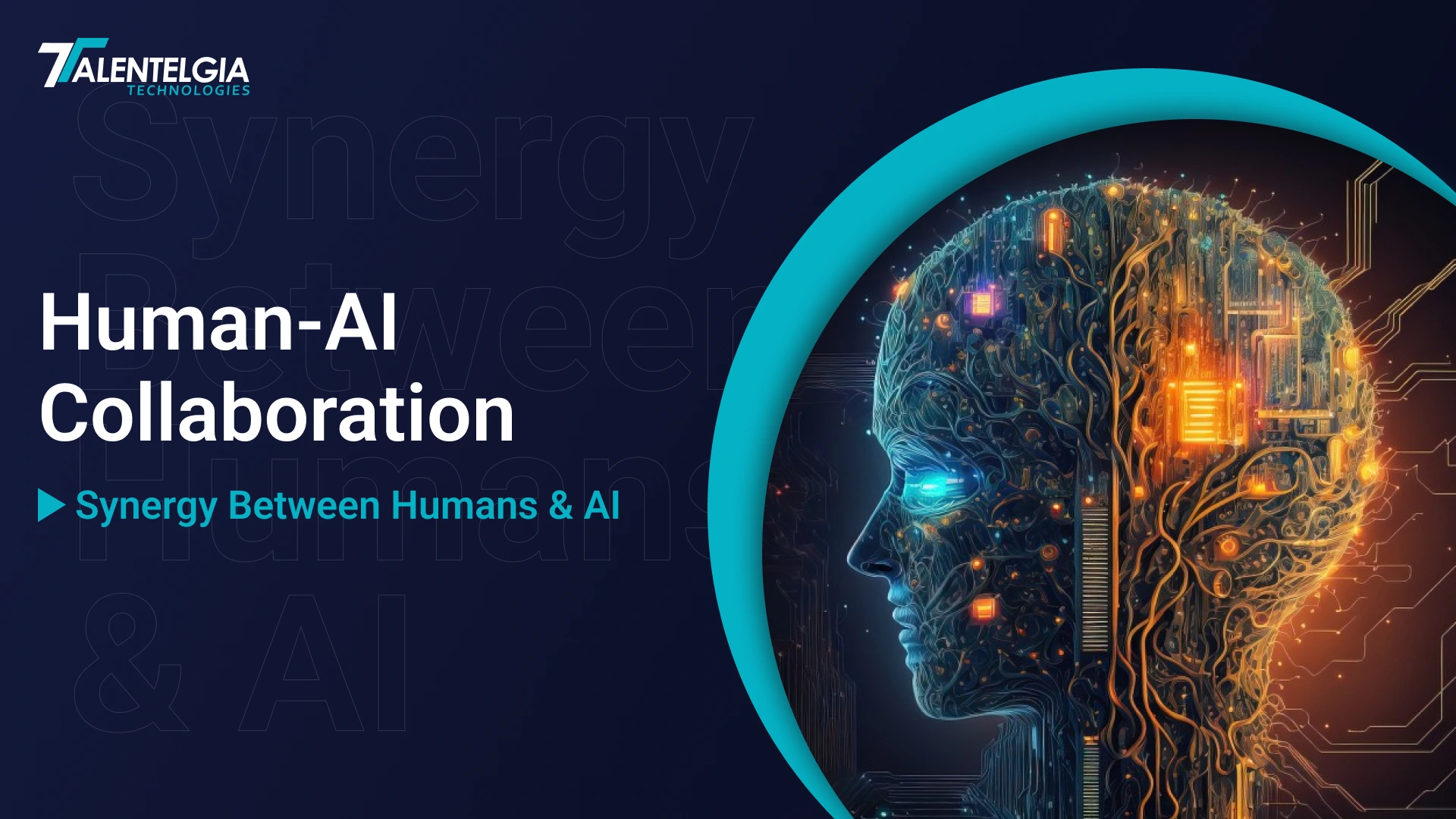AI is changing the way SEO operates. You might think it’s all about keywords, but this is where most professionals and businesses go wrong. AI in SEO uses data to optimize your strategies, generating traffic and increasing your reach. Many businesses have now realised its importance and how do we know this? Well, the data speaks for itself. According to Seoprofy, 35% of companies use AI for SEO-driven content strategies, while 52% see better results from AI-powered on-page SEO.
Now, the question is, how do you reap the benefits of AI in SEO? Well, our advice would be, to think beyond traditional SEO practices. Analyze your competitors, refine your content, and integrate other practices to improve your SEO model. This will help you reach your target audience and generate business. However, this is just the tip of the iceberg and if you want to learn more, continue reading this blog because we have covered all the fundamentals of AI in SEO and you will surely understand the importance by the time we end this blog. Let’s dive in!
What is AI in SEO?
AI in SEO is the integration of artificial intelligence to enhance the search engine optimization strategy. Machine learning, data analysis, and automation are all used to help improve rankings. Unlike traditional SEO, AI processes large amounts of data much faster, thus it can pick up trends, user behavior, and changes in the algorithm of search engines.
Marketers can optimize content, refine keyword strategies, and enhance on-page SEO performance by simply AI integration in SEO. Moreover, you can have automated content creation, voice search optimization, and predictive analytics to increase your visibility. As search engines become more advanced, AI ensures websites stay competitive by adapting to evolving ranking factors.
How Can AI Help With SEO?
AI is reforming SEO by providing data-driven insights and automating optimization processes. With its ability to analyze vast amounts of data quickly, AI can change how marketers approach their SEO strategies. Let’s explore how AI can help enhance various aspects of your SEO efforts:
- Understand Your Audience
AI in SEO can analyze audience behavior, preferences, and search intent with incredible accuracy. It processes reviews, social media mentions, and website interactions to uncover key insights.
Moreover, it can track use behavior and analyze engagement patterns, traffic sources, and content performance. It even predicts future actions, so you can create strategic audience segments. What more? It can decode public sentiment to show how your brand is perceived online, helping to refine your messaging.
Furthermore, using insights from AI-driven tools, you can personalize an SEO strategy and create relevant content that enhances the user experience. This will lead to higher rankings and better engagement for a brand.
2. Generative AI For Smart Content
If you are a fan of generative AI development, we have some good news for you. Generative AI tools can automate content creation and optimize your on-page elements. You can generate high-quality, relevant content targeting specific keywords and improve your content quality immensely. Moreover, generative AI tools can analyze top-ranking content suggest new topics, and help you improve your content structure. What more? You can even rewrite your content to meet evolving search engine algorithms.
You can enhance your meta descriptions, alt text for images, and title tags. Ultimately, this leads to smart content creation and ensures that your SEO strategy stays on track and ready to face competition.
3. Enhance Website Performance
AI can help identify and resolve technical errors in your website. It can highlight issues like 404 errors and slow loading time. For instance, let’s suppose your e-commerce site is facing a high bounce rate on product pages. Here, you can identify the reasons like loading error or others. By doing this, you will be prioritizing user experience which will ultimately lead to increased traffic. As a result, AI in SEO can help you with fast resolutions and enhanced website functionality.
4. Video and Image Recognition Improvement
AI enhances video and image content analysis by using image recognition apps to identify trending topics and keywords. That means marketers can position their content to attract higher attraction through visual media.
For example, a travel blog can utilize AI to find out which pictures attract the audience most. If landscape photos or iconic landmarks create more engagement, you can adapt your content strategy to feature more attractive visuals. This approach enhances user interaction and helps create content that aligns with audience preferences, thereby increasing website traffic.
Best AI SEO Tools & How to Use Them
- ChatGPT
ChatGPT is a great tool for brainstorming tasks and data analysis, and it offers a free version and a paid plan at $20/month. But it has its limitations. While it’s great for brainstorming and analyzing data, ChatGPT does not have access to real-time SEO data. It cannot be used to find keywords or analyze SERPs. It is also not suitable for long-form content creation because it does not have the required data integration for SEO.
Even though it has limitations, ChatGPT is very useful for so many SEO-related tasks. For instance, it can help optimize your existing content for target keywords and assist in tailoring your content to your buyer personas. It’s also effective for clustering keywords and analyzing a variety of data, which makes it very useful for improving your content strategy and brainstorming fresh ideas.
- Rank IQ
Rank IQ is a popular content optimizer that can help you analyze your blog trends based on verified factors. It provides you with word count, topics to write, and all-in-all essential keywords that you should use in it. The title recommendation engine is also there to increase the impact of your titles.
You can go ahead with RankIQ if you are looking for low-competition keywords, optimizing existing posts, or writing new ones. It is an indispensable tool in any AI-driven SEO strategy for smarter content creation and optimization.
- Gemini
Gemini excels at producing very conversational, easy-to-read, and even human-like content when the right prompts are provided. The output quality will depend on the prompts that you are giving but it’s an amazing tool for defining topics and completing the sentences if you can’t figure out the entire phrase.
The content generated through Gemini is searched very well on the internet; hence, its usage can improve your SEO immensely.
Quick Read: Gemini API Costs
- Leap AI
Leap AI offers a robust set of tools intended to simplify your tasks. The tool covered pretty much everything from keyword research to AI-driven blog posts and lead generation. Amazing right? Moreover, it has some innovative features including AI image generation, blog post creation, and text-to-speech capability. Leap AI can also turn YouTube videos into blog posts, create newsletters, and convert articles to podcasts.
You basically have a permanent 24/7 marketing assistant by your side. It can relieve you from a variety of repetitive tasks. You can then focus on urgent deliverables boosting the overall productivity while having a reliable tool by your side.
- HubSpot
HubSpot’s AI-powered Content Assistant is an all-in-one tool that aims to simplify content creation for small to medium-sized SEO teams, professionals, and bloggers. It’s perfect for SEO agencies that need a solution to optimize and accelerate content processes. The tool makes the content creation process much easier, as it helps with tasks such as blog topic generation, marketing email composition, and content outline and paragraph writing automation.
It connects smoothly with its platform’s CRM and marketing tool for an effective all-in-one content management system. The support from AI ensures writer’s block can be eradicated, brings up fresh approaches to topics, and does not fail to remember SEO fundamentals.
- Semrush
Semrush is a one-stop AI SEO tool to help managers manage different aspects of website growth, such as SEO, content marketing, social media, and paid advertising. Key features include an on-page SEO checker, SEO content templates, and an AI writing assistant.
Semrush is a trusted tool for site audits, website performance tracking, and niche keyword research. It stands out among alternatives with its free plan, which can be used to quickly check the keywords or site. Its Keyword Magic tool can generate thousands of keyword ideas based on a single seed keyword. Semrush is also transparent about its data sources, which lends credibility and value to the platform.
- Frase
Frase is an AI-powered content and SEO tool, designed to help with both the creation and optimization of content. It helps with the acceleration of relevant content creation for SEO professionals, content marketers, as well as businesses to improve search rankings. Some of its key features are content brief generation, AI writing assistance, SEO research, keyword optimization, and topics with competitor analysis.
This ensures that the content published is aligned with SEO best practices while saving research and content creation time. It’s perfect for scaling content production with data-driven decisions that improve organic traffic. With AI-powered insights, Frase supports effective workflows and good SEO strategies.
4 AI In SEO Best Practices

AI can help streamline and improve your SEO strategy through the automation of routine tasks. However, to ensure that you get optimum results, it’s advisable to follow these best practices:
1. Identify Key Areas for AI Integration
You can start by evaluating where AI can be used effectively in your SEO strategy. Our advice would be to focus on repetitive tasks or processes that are time-consuming and can be done by AI. This can include keyword research or data analysis. We all know that AI is best at analyzing patterns which makes it ideal for high-value keywords and site performance evaluation. This way you can focus on other priority tasks and leave the rest to effective AI tools.
2. Use Detailed Prompts for Better Results
The output quality of your AI tools will depend on the clarity of input being provided. Instead of using vague instructions, it is feasible to provide direct and specific prompts. For instance, if you are generating content, try offering more context, target keywords, and a desired tone. This will enable the AI to understand your needs a bit better and provide your desired output.
Here’s a good example, instead of simply asking, “Write a blog post,”, try, “”Write a 500-word blog post on the benefits of AI in SEO targeting the keyword ‘AI tools for SEO’ in an informative and professional tone.”
3. Review and edit AI-generated content regularly
It’s great that AI can create fast content, but human oversight is still necessary. AI may lack the nuance and context of human touch. This might result in a less than 100% output. All AI-generated content should be reviewed to ensure that it is on-brand, relevant, and free of errors. Checking for plagiarism is also an important aspect of maintaining the quality and authenticity of the content.
Quick Read: Human AI Collaboration
4. Monitor SEO performance and optimize continuously
While AI is handy in coming up with mass content in a short period, monitoring is still important. Monitor how your content is doing in search engines and analyze the traffic data for areas of improvement. Use the insights from AI to adjust your strategy, refine your keywords, and stay ahead of trends. This is mainly because optimizing your content regularly ensures that your SEO efforts remain effective over time.
Conclusion
AI Integration in SEO is changing the digital landscape. It enables businesses to work smarter, not harder. Using AI-powered tools, you can upgrade every element of your SEO strategy, content creation, and keyword research to enhance your visibility and reach. Moreover, it is also important to note that even though AI offers great value in terms of automation and insights, human oversight is necessary for quality and relevance. By following best practices and continuously optimizing your approach, you will be able to remain ahead of the competition and improve your rankings, as well as engage your audience.


 Healthcare App Development Services
Healthcare App Development Services
 Real Estate Web Development Services
Real Estate Web Development Services
 E-Commerce App Development Services
E-Commerce App Development Services E-Commerce Web Development Services
E-Commerce Web Development Services Blockchain E-commerce Development Company
Blockchain E-commerce Development Company
 Fintech App Development Services
Fintech App Development Services Fintech Web Development
Fintech Web Development Blockchain Fintech Development Company
Blockchain Fintech Development Company
 E-Learning App Development Services
E-Learning App Development Services
 Restaurant App Development Company
Restaurant App Development Company
 Mobile Game Development Company
Mobile Game Development Company
 Travel App Development Company
Travel App Development Company
 Automotive Web Design
Automotive Web Design
 AI Traffic Management System
AI Traffic Management System
 AI Inventory Management Software
AI Inventory Management Software
 AI Software Development
AI Software Development  AI Development Company
AI Development Company  AI App Development Services
AI App Development Services  ChatGPT integration services
ChatGPT integration services  AI Integration Services
AI Integration Services  Generative AI Development Services
Generative AI Development Services  Natural Language Processing Company
Natural Language Processing Company Machine Learning Development
Machine Learning Development  Machine learning consulting services
Machine learning consulting services  Blockchain Development
Blockchain Development  Blockchain Software Development
Blockchain Software Development  Smart Contract Development Company
Smart Contract Development Company  NFT Marketplace Development Services
NFT Marketplace Development Services  Asset Tokenization Company
Asset Tokenization Company DeFi Wallet Development Company
DeFi Wallet Development Company Mobile App Development
Mobile App Development  IOS App Development
IOS App Development  Android App Development
Android App Development  Cross-Platform App Development
Cross-Platform App Development  Augmented Reality (AR) App Development
Augmented Reality (AR) App Development  Virtual Reality (VR) App Development
Virtual Reality (VR) App Development  Web App Development
Web App Development  SaaS App Development
SaaS App Development Flutter
Flutter  React Native
React Native  Swift (IOS)
Swift (IOS)  Kotlin (Android)
Kotlin (Android)  Mean Stack Development
Mean Stack Development  AngularJS Development
AngularJS Development  MongoDB Development
MongoDB Development  Nodejs Development
Nodejs Development  Database Development
Database Development Ruby on Rails Development
Ruby on Rails Development Expressjs Development
Expressjs Development  Full Stack Development
Full Stack Development  Web Development Services
Web Development Services  Laravel Development
Laravel Development  LAMP Development
LAMP Development  Custom PHP Development
Custom PHP Development  .Net Development
.Net Development  User Experience Design Services
User Experience Design Services  User Interface Design Services
User Interface Design Services  Automated Testing
Automated Testing  Manual Testing
Manual Testing  Digital Marketing Services
Digital Marketing Services 
 Ride-Sharing And Taxi Services
Ride-Sharing And Taxi Services Food Delivery Services
Food Delivery Services Grocery Delivery Services
Grocery Delivery Services Transportation And Logistics
Transportation And Logistics Car Wash App
Car Wash App Home Services App
Home Services App ERP Development Services
ERP Development Services CMS Development Services
CMS Development Services LMS Development
LMS Development CRM Development
CRM Development DevOps Development Services
DevOps Development Services AI Business Solutions
AI Business Solutions AI Cloud Solutions
AI Cloud Solutions AI Chatbot Development
AI Chatbot Development API Development
API Development Blockchain Product Development
Blockchain Product Development Cryptocurrency Wallet Development
Cryptocurrency Wallet Development About Talentelgia
About Talentelgia  Our Team
Our Team  Our Culture
Our Culture 
 Healthcare App Development Services
Healthcare App Development Services Real Estate Web Development Services
Real Estate Web Development Services E-Commerce App Development Services
E-Commerce App Development Services E-Commerce Web Development Services
E-Commerce Web Development Services Blockchain E-commerce
Development Company
Blockchain E-commerce
Development Company Fintech App Development Services
Fintech App Development Services Finance Web Development
Finance Web Development Blockchain Fintech
Development Company
Blockchain Fintech
Development Company E-Learning App Development Services
E-Learning App Development Services Restaurant App Development Company
Restaurant App Development Company Mobile Game Development Company
Mobile Game Development Company Travel App Development Company
Travel App Development Company Automotive Web Design
Automotive Web Design AI Traffic Management System
AI Traffic Management System AI Inventory Management Software
AI Inventory Management Software AI Software Development
AI Software Development AI Development Company
AI Development Company ChatGPT integration services
ChatGPT integration services AI Integration Services
AI Integration Services Machine Learning Development
Machine Learning Development Machine learning consulting services
Machine learning consulting services Blockchain Development
Blockchain Development Blockchain Software Development
Blockchain Software Development Smart contract development company
Smart contract development company NFT marketplace development services
NFT marketplace development services IOS App Development
IOS App Development Android App Development
Android App Development Cross-Platform App Development
Cross-Platform App Development Augmented Reality (AR) App
Development
Augmented Reality (AR) App
Development Virtual Reality (VR) App Development
Virtual Reality (VR) App Development Web App Development
Web App Development Flutter
Flutter React
Native
React
Native Swift
(IOS)
Swift
(IOS) Kotlin (Android)
Kotlin (Android) MEAN Stack Development
MEAN Stack Development AngularJS Development
AngularJS Development MongoDB Development
MongoDB Development Nodejs Development
Nodejs Development Database development services
Database development services Ruby on Rails Development services
Ruby on Rails Development services Expressjs Development
Expressjs Development Full Stack Development
Full Stack Development Web Development Services
Web Development Services Laravel Development
Laravel Development LAMP
Development
LAMP
Development Custom PHP Development
Custom PHP Development User Experience Design Services
User Experience Design Services User Interface Design Services
User Interface Design Services Automated Testing
Automated Testing Manual
Testing
Manual
Testing About Talentelgia
About Talentelgia Our Team
Our Team Our Culture
Our Culture

















 Write us on:
Write us on:  Business queries:
Business queries:  HR:
HR: 




